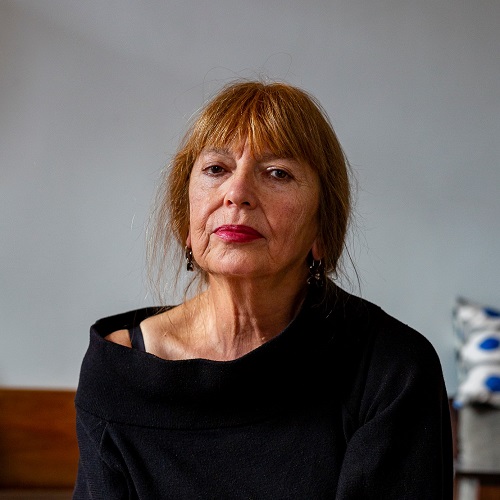PL 1988 | Director, Script: Irena Kamieńska | Camera: Krzysztof Pakulski | Editor: Jadwiga Zajiček | Production: Zbigniew Domagalski | b/w | 35mm | 15 min | polish OV with english SUB + german SUB | Archive International Short Film Festival Oberhausen / Wytwórnia Filmów Dokumentalnych i Fabularnych
Just one year before the first free election of 1989, Kamieńska once again turns her gaze to the emancipated female, to produce this moving portrayal of women, who under Communism, assumed male jobs. It is as much a story of female strength and persistence as it is of women’s exploitation in the job market. (Anna Misiak, womenundercommunism.com)
Multi-award-winning hardcore realism from Kamieńska, who passed away in 2016, a swansong to the reality of the socialist heroine known as the “working woman” in all its impossible distance from the totality of emancipatory ideals: a joyless reality, according to the director, lonely and without perspective. (Barbara Wurm, goEast – Festival des Mittel- und Osteuropäischen Films, Wiesbaden)

| Acronyms | |
|---|---|
| amer. | American English |
| b/w | Black and white |
| OV | Original version |
| SUB | Subtitles |
| +SUB | electronic live subtitling (below the image) |
| INT | Intertitles |
| Countries | |
|---|---|
| AT | Austria |
| FRG | Federal Republic of Germany (historic) |
| BLR | Belarus |
| DE | Germany |
| CAN | Canada |
| GDR | German Democratic Republic (historic) |
| EGY | Egypt |
| FR | France |
| GB | Great Britain |
| URY | Uruguay |
| BRA | Brasil |
| SWE | Sweden |
| UKR | Ukraine |
| PL | Poland |
| IDN | Indonesia |
| PRT | Portugal |
| HRV | Croatia |
| ECU | Ecuador |
| HUN | Hungary |
| AUS | Australia |
| IT | Italy |
| MEX | Mexico |
| IND | India |
DDR 1989 | Director: Helke Misselwitz | Script: Helke Misselwitz, Thomas Plenert | Camera: Thomas Plenert | Editor: Gudrun Plenert | Music: Brigitte Unterdörfer | Sound: Ronald Gohlke | Dramatic Composition: Bernd Burkhardt | Productionsleitung: Herbert Kruschke | b/w | 35mm | 16 min | german OV | DEFA Stiftung
Portrait of a private coal company in East Berlin’s Prenzlauer Berg district in 1988/89. The feisty woman boss runs the business with humour and understanding. Her seven male employees respect her. To the outside world, they are all tough guys, but as they describe their jobs and personal situations, above and beyond the hard manual labour, their vulnerability starts to come to light. Under gentle questioning, the subjects of this social survey by Helke Misselwitz willingly allow the audience a “look into their hearts”: “Can hands this rough be tender?” That approach makes it seem, at times, as if this were a utopia of solidarity at the margins of the Socialist workers’ state. Looking at these figures “from below”, the film touches on many taboos. The discussion subjects range from the building of the Berlin Wall and possible escape, to child abuse and suicide, as well as prison and alcoholism. Fiercely intent on authenticity, which is why it was shot in “outmoded” black-and-white, the film documents a trade that would soon itself become obsolete – turning it into a survey of social contradictions in East Germany, made just a few months before the country’s political collapse. (Jörg Schöning, 69. Internationale Filmfestspiele Berlin)

| Acronyms | |
|---|---|
| amer. | American English |
| b/w | Black and white |
| OV | Original version |
| SUB | Subtitles |
| +SUB | electronic live subtitling (below the image) |
| INT | Intertitles |
| Countries | |
|---|---|
| AT | Austria |
| FRG | Federal Republic of Germany (historic) |
| BLR | Belarus |
| DE | Germany |
| CAN | Canada |
| GDR | German Democratic Republic (historic) |
| EGY | Egypt |
| FR | France |
| GB | Great Britain |
| URY | Uruguay |
| BRA | Brasil |
| SWE | Sweden |
| UKR | Ukraine |
| PL | Poland |
| IDN | Indonesia |
| PRT | Portugal |
| HRV | Croatia |
| ECU | Ecuador |
| HUN | Hungary |
| AUS | Australia |
| IT | Italy |
| MEX | Mexico |
| IND | India |
Followed by a conversation with Helke Misselwitz
Director, born in 1947 in Zwickau, Abitur and carpenter, trained as a physiotherapist in Erfurt, assistant director at youth television, 1978-1982 studied directing at the Babelsberg Film Academy. From 1983 freelance at the DEFA Studio for Documentary Films. 1985-88 Meisterschülerin with Heiner Carow at the Academy of Arts of the GDR, 1988-91 permanent position at the DEFA Studio for Documentary Films, then freelance writer and director. 1997-2014 Professor of directing at the HFF KONRAD WOLF in Babelsberg. Since 1991 member of the Academy of Arts Berlin.
Films include: Ein Leben, Haus.Frauen., Stilleben/Eine Reise zu den Dingen, Tangotraum, Winter adè, Who's Afraid of the Bogeyman, Sperrmüll, Herzsprung, Meine Liebe/Deine Liebe, Engelchen, Fremde oder, Helga Paris/Fotografin, The Poet’s Wife.







